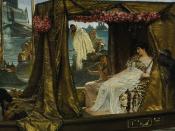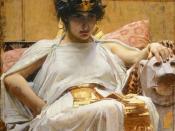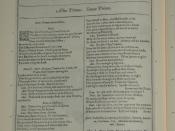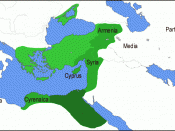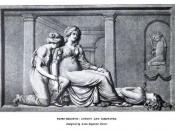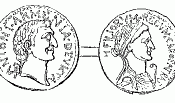Antony's Sword, his delight and his destruction A discussion of Shakespeare's "Antony and Cleopatra In Shakespeare's Roman tragedy "Antony and Cleopatra", we are told the story of two passionate and power-hungry lovers. Both are characters that possess a god-like status. Antony is often associated with "Mars" (1.1.4; 2.2.6; 2.5.117), the god of war, and, Cleopatra with "Venus" (2.2.210), the goddess of love, or better said, the goddess of affection and passion. Throughout the entire play, Antony finds himself torn between a desire to be with Cleopatra and an equally strong desire to seek and maintain power in Rome. The Roman leader becomes a virtual prisoner of lechery and has to choose between an empire and love. However, the goddess of love overpowers the god of war. Antony himself says: "My sword made weak by my affection" (3.11.66). This statement establishes an important issue of the play: the struggle between passion (love) and power (war).
It is obvious that Antony's sword, a symbol of both his lust and being a great warrior, leads the play to its climax.
Antony is a clear example of a ruler who has thrown away a kingdom for lust. He thrusts himself upon his sword, a symbol of his manhood. From the moment they met, Antony was enchanted by Cleopatra's extraordinary appearance: "when she first met Mark Antony, he pursed up his heart upon the river Cydmus" (2.2.197-198). He submits himself dangerously to the seductive Egyptian Queen and, the latter is fully aware of her sexual dominance. She makes this clear to Charmian, her servant, by boasting about the way she had captured Antony: "That time? O times! I laughed him out of patience, and that night I laughed him into patience, and next mourn, Ere the ninth hour, I drunk him to his bed, Then put my tires and mantles on him, whilst I wore his sword Philippan (2.5.18-23) It is evident that the charms and sexual delights of the cunning Cleopatra have blinded Antony completely.
Antony's increasing adoration of Cleopatra also affects the opinion of his subjects. From the beginning of the play, his fellow soldiers express their undisguised contempt for the passionate relationship between their general and his Egyptian Monarch. Philo, in particular, is worried about "this dotage" (1.1.1) his general has for Cleopatra. He believes that Antony's passion "o'erflowes the measure" (1.1.2.). Philo fears that Egypt's mysterious lust and passion has turned his fierce warrior into a common man addicted to love. He worries that "the tripple pillar of the world" (1.1.12) has been transformed into a "strumpet's fool" (1.1.13). The first act indicates that Antony's interests are only focused on his "gypsy's lust" (1.1.9). So, in this part of the play, Antony's sword is used as an instrument of sexual pleasure. It is his weapon to let Cleopatra "die" (1.2.145). In simple words this means that Antony's sword, a symbol of his manhood, enables Cleopatra to experience sexual climaxes.
In Act III, the pleasure loving Antony is transformed into a bitter, defeated warrior. He blames Cleopatra for his defeat: "O, wither has thou led me, Egypt?" (3.11.51). "You did know how much you were my conqueror, and that my sword, made weak by my affection" (3.11.65-66). Here, Antony admits that his passions for Egypt have weakened his position as a fierce warrior. The lecherous moments between him and his Egyptian Conqueror have resulted into a great loss: his loss of power. But, since Cleopatra knows how to twist Antony around her little finger, he submits once again to her love. He buries his sad thoughts and thinks only of what he has gained: "Fall not a tear, I say; one of them rates And that is won and lost. Give me a kiss." (3.11.69) Now Antony is determined to defeat Octavius Caesar, who "kept his sword e'en like a dancer" (3.11.35), in the next battle. Antony believes that he is a greater warrior than Caesar, and, therefore, challenges him: "sword against sword" (3.13.27). In this scene, Antony tries to prove that his sword is not only a symbol of his manhood, but also a token of being a courageous fighter.
Unfortunately, Antony withdraws from the sea battle when Cleopatra has fled. This is an indication of his dependency on the Egyptian Queen, and, it is this dependency that leads him to lose the final battle. It is therefore not strange that Antony blames Cleopatra once again for his great loss: "She has robbed me of my sword" (4.14.23). It is obvious that Cleopatra not only possesses his body, but also his soul. The god of war is now forced to confront his tragic situation. The only way to safe his face is "to fall on his face" (4.14.104), his ultimate deed to prove that he is a courageous warrior. The sword that was once his symbol of delight turns out to be his destruction.
"Noce Te Ipsum", "Know Thyself", the wise Socrates has proclaimed. In "Antony and Cleopatra" we get acquainted with Antony, a man who does not know how to live by this by this important rule of life. He is trapped in the pshychomachia, the war between passion and reason. In this play, passion is definitely the victor of the battle. Antony proves to be a real Elizabethan man, a passionate lover. According to Shakespeare, however, his role as passionate lover cannot be combined with that of an ideal ruler. An ideal ruler is a passionless man, so, reason should prevail. Therefore, one may conclude that in Shakespeare's opinion, Antony did not use his sword properly and that is why he became a victim of his own fault.
